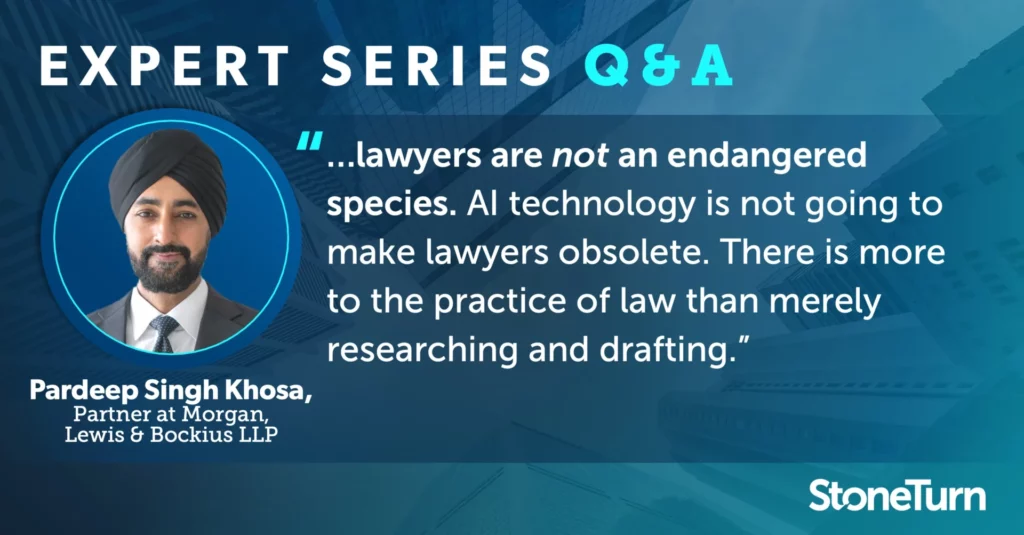Tell us about yourself? Hobbies?
I am a partner at Morgan Lewis & Bockius LLP (MLB), which is a global law firm with offices across the world in Asia, the United States, Middles East and Europe, and a director of Morgan Lewis Stamford LLC, which is a Singapore law corporation affiliated with MLB.
By day, I handle civil and commercial disputes in litigation and arbitration. What that really means is that I spend most of my time devising different ways to say that my opposing counsel is wrong, fretting what my opposing counsel will say in response, and worrying what the Judge or arbitrator will think of it all.
By night, I am an Olympic gold medallist in marathons on Netflix and Amazon Prime.
On the weekends, my wife very kindly instructs me on what exactly I should do to fill the time that I might have. That usually involves chauffeuring her and the girls (we have two daughters, aged 6 and 4) to their many social engagements.
It’s been a few months now since you joined Morgan, Lewis & Bockius. How have things been and have you settled in well?
I joined MLB about a year ago in October 2022. And you know what they say, “Time flies when you are lawyering.” Or at least that is what my juniors tell me when we have a deadline drawing fast upon us.
The journey so far has been smooth, due in no small part to my colleagues and partners who have been very kind, welcoming and helpful. I have also really bonded well with the office furniture and become intimately familiar with the office coffee machine’s quirks, which have been conducive to settling in.
What are the trends in the dispute space in 2023 and beyond?
Two trends come to mind.
First, environmental, social, and governance (ESG) related disputes have been increasing and that trend is likely to continue in 2023 and beyond.
Governments and regulatory bodies have implemented ESG-related regulations, including disclosure and reporting obligations, which continue to evolve. Depending on the industry, companies are also increasingly subject to ESG-related contractual obligations, including commitments to comply with specific environmental standards, labour practice and ethical considerations. Investor activism is also on the rise.
These matters are all contributing to increasing questions and disagreements over the applicable standards, their interpretation, and how to comply with the applicable standards. There are also increasing numbers of greenwashing claims.
Second, technology related disputes are likely to increase, driven in large part by the rapidly increasing use of artificial intelligence (AI) technology.
Generative AI (like for example, ChatGPT) is trained using vast amounts of data and creates new products or designs, which raises questions of infringement of the copyright in the data and questions of authorship and ownership of the intellectual property rights of those new creations.
Companies are also increasingly integrating AI into their products and systems as well as moving away from in-house IT infrastructure to cloud services, which are going to throw up, among other things, contract performance issues, and disputes over data privacy and security.
StoneTurn is receiving more requests for asset-tracing and corporate investigations. How would you advise your clients who are considering whether to embark or before embarking on such exercises?
I am not surprised that StoneTurn is receiving more requests for asset-tracing and corporate investigations. These are vital components of financial and legal due diligence. They help to identify assets, uncover financial irregularities and potential wrongdoings, and gather evidence of these matters which can be used in legal proceedings.
The question of whether to embark on these exercises and, if so, how they should be undertaken depends in large part on what is at stake and the resources that are available.
For example, asset tracing serves a valuable function in cases of fraud, embezzlement, and misappropriation. Identifying where the assets have ended up in these cases usually assists in identifying the facts that will form the basis of the civil claims, throw light on the involvement of other potential wrongdoers which will shape the litigation strategy, and give the client a better sense of the prospects of recovery.
As another example, corporate investigations are necessary when there is a complaint or whistleblower allegations about corporate misconduct. It would be important for the client to properly investigate the matter to see if there was any wrongdoing, and if so, to take remedial action, failing which there may be similar episodes in the future and as a consequence of which the client may be exposed to regulatory action or suffer serious pecuniary loss.
Not undertaking a corporate investigation in those circumstances also carries the risk of the client suffering a reputational hit if it later comes to light that the complaint of corporate misconduct was ignored.
We have all heard discussions around ChatGPT and that it might take over certain roles, including that of lawyers. What are your views?
AI technology like ChatGPT can perform a variety of tasks, including answering questions and providing explanations with humanlike language fluency.
That capability can naturally cover some of the work that lawyers do, like for example, research and drafting. In fact, AI-powered tools can quickly review mountains or documents and information and provide relevant case law, statutes, and precedents, at a speed which lawyers cannot match.
But lawyers are not an endangered species. AI technology is not going to make lawyers obsolete. Lawyers are not merely word merchants. There is more to the practice of law than merely researching and drafting.
A senior and well-respected lawyer once described lawyers as emotional labourers. Lawyers are often the first port of call to families, workers and businesses who are in trouble. They are looked to for assistance not just for their legal knowledge, but also their values, resilience, and people skills. While manual labourers use their hands, emotional labourers use their hearts.
Further, one of the many things lawyers do is to exercise judgment and offer strategic guidance. In disputes, for example, these strategic calls include which defendant to sue, the jurisdiction in which the claims should be brought, which witnesses should be called, and the questions that should be put to the other side’s witnesses in cross-examination. These are matters of judgement that a lawyer is constantly confronted with, and which a lawyer will make, having regard to the unique facts of each case, and drawing on the lawyers’ experience and instinct.
Lawyers also know that not every dispute can or should see the light of day in Court or arbitration. Many would be better resolved by way of mediation, the success of which in many instances depends on a lawyer’s sense of empathy and negotiation skills.
What are the biggest challenges you and/or the legal fraternity face now or going forward?
Attracting and retaining talent appears is a major challenge confronting the legal fraternity.
It is not easy being a lawyer. Lawyers tend to work long hours, including weekends and evenings, to keep to deadlines. And they are expected to deliver in circumstances where the stakes are high, which can be stressful.
These issues tend to be all the more acute for younger lawyers, who are still learning. It is not uncommon for them to feel that the workload or fear of making mistakes can be overwhelming.
These are just some of the reasons why it appears to be difficult to attract and retain talent.
On our part, we have sought to address some of the concerns and aspirations of younger lawyers that we have, by creating a supportive and fulfilling work environment. There is a concerted effort to manage their workloads, provide flexibility in the way they work and promote the importance of downtime.
We also regularly acknowledge their contributions and achievements and, where possible, involve them in diverse assignments so that they can develop a range of skills. It is not a panacea. But it is hopefully a start.
We also have a number of initiatives to promote the well-being of our lawyers including ML Well, which promotes intellectual, physical, emotional, and occupational well-being coupled with an underlying emphasis on engagement and community. Part of the ML Well curriculum includes an online portal featuring cutting-edge research, events, and news related to positive psychology, as well as information on our firm’s well-being-related policies and benefits.
What advice would you give to your younger self?
If I had to give my younger self one piece of advice, it would be this: don’t let your fear of what others think hold you back.
It is an idea that has been present to my mind for a long time, but the gravity of which increased exponentially after I became a parent.
As we say to our kids, it is important in many instances to consider what someone else thinks or does. But ultimately, you should chart your own course, and make decisions that are driven by your values and aspirations. You will no doubt make mistakes along the way. But that is fine. Take responsibility, focus on learning, and enjoy the journey. You will be better for it.






